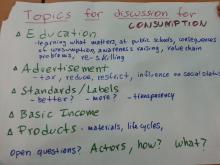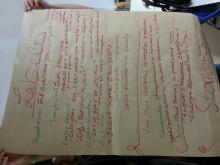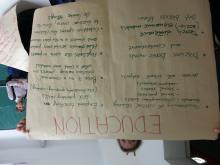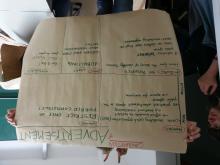
Protocol Day 2 (consumption)
Gap on Consumption – September 4th, 2014, Degrowth Conference, S313
Attendence: 17 People
(clockwise: Felix, Lukas, Corinna, Martin, Dieter, Kathi, Christine, Melani, Anke, Martin, Alex, Karl-Heinz, Christiane, Christopher, Ben, Anne, Dietmar) – Anke is new (welcome!), Kathrin has a flew, good health!
Time Schedule:
17:30-17:35 warming up
17:45-17:45 resume of day 1 + feedback
17:45-17:50 Barcelona
18:06-18:45 stirring paper II
18:45-18:55 stirring paper III
18:40-19:00 consensus for moving forward
warming up:
How you feel about yesterday? 3 words
Resume of day 1 + Feedback from community:
Read all cards from the group session and distribute them in the room by interest
Barcelona:
again put attention on some notes from Barcelona and connect them with our ideas
Paper II: Self-providing as a motor for degrowth
Corinna:
Assumptions:
All people move in one direction → growth, degrowth is a different direction.
Self provision is the answer to degrowth!
Micro level: Changing direction will make people feel more skillfull.
Meso level: More resources will be in place.
Macro level: systematic change, paradigmic change
Questions:
How we can make people change directions?
Action:
Academia for sufficiency which tries to provide small containers of sufficiency actions. Spaces where local self sufficiency is practiced.
Discussion:
Handshake: Some like the narrative of self sufficiency. / Others don´t see it as a big pathway. / Agreement that on sum goods it might be nice.
Anke: Some agree on micro level of self-production will produce self-change, but discussion on macro level results.
Dieter: Corina´s research message is it will change the macro level.
…: Problem of upscaling to some goods can danger the good narrative.
Melani: I thought of auto-archism , which I feel is not a way. But in the discussion about learning and bringing together communities it is useful for.
Christiane: Do we need a positive narrative?
Paper III: Where does Responsibility begin and end?
Anke:
Assumptions:
Material flow accounting on country level on hidden material flows. E.g. you not only import a good with its materials but also the energy and the waste kept back for production of the good.
It is going to become a indicator using GDP methods and aiming for being at such a status.
EU lines out such initiatives to be fruitful.
Questions:
What can the individual consumer be held responsibility for? There are boundaries of making people accountable for it.
Action:
Research on an new indicator.
Discussions
Responsibility is related also to social impacts. / We focus on environmental impact.
Pricing is not the point, but putting awareness.
What is it for? / Data helps to see my responsibility. Or at least
Internalization? Is it a product footprint?/ Yes it is a footprint system. Global North is supposed to dematerialize. The indicator may help doing it. But no internalization.
How is it related to eco-labeling?/ Life-cycle analysis and eco-labeling, yes! Footprint differently tries to deeper back track the resource need.
Consensus for moving on tomorrow:
we stop for now
we want to rate and cluster proposals in the room
we narrow it down tomorrow on 3-4
we cluster today
we prioritize the clusters
Pictures from the last GAP session, see Attachments.
- 933 reads




